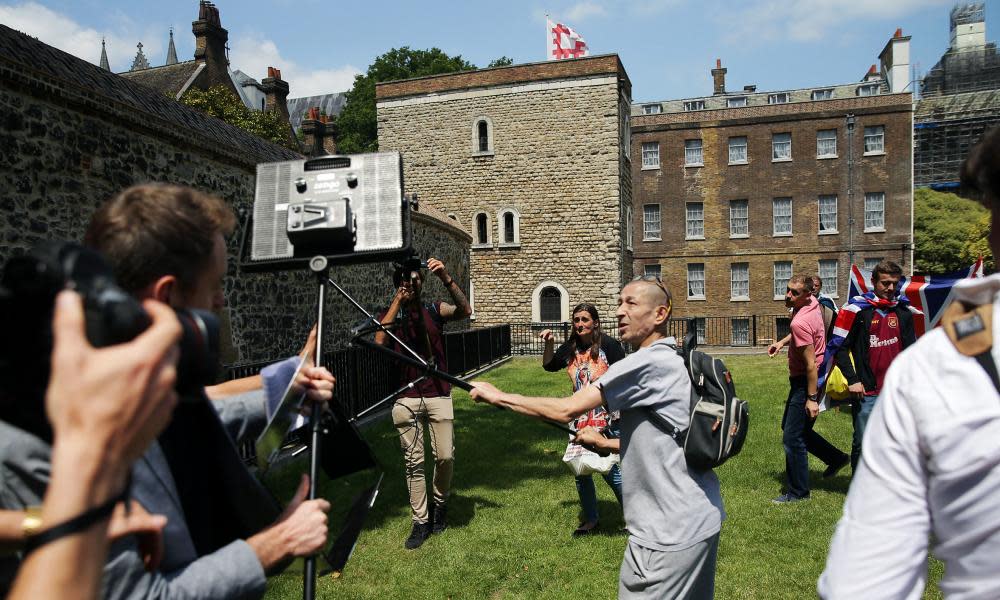How do we tackle this contempt for honest reporting?

Shortly after the BBC director general Tony Hall last week warned of increased threats facing journalists, notably in places such as China and Nigeria, protesters attacked a BBC news crew in Westminster.
The fracas, in which supporters of Tommy Robinson, furious with his jail sentence stopped a live BBC news broadcast, was an almost perfect illustration of how, in Hall’s words, “reporting the news has never been more dangerous”. Not because the attack, largely carried out it seems by a man wielding a tripod, left anyone seriously hurt, but because such violence has spread to parts of the world where the freedom to report has for generations, been considered an inalienable right.
During a two day Foreign Office-hosted conference, Lord Hall told of BBC staff being arrested or harassed around the world.
A day later, a senior police officer in Britain’s biggest police force threatened journalists with arrest for printing government leaks of the Kim Darroch memos, a state of affairs more common in authoritarian states such as Russia.
Threats such as this from the Metropolitan Police counter-terrorism chief, Neil Basu, thrive in a world in which the lack of faith in the media is allowed to increase.
Many of the most dangerous countries, such as Saudi Arabia and Burundi, were not represented at the media freedom event in London. Abuses such as the murder of the Saudi columnist Jamal Khashoggi helped make 2018 the worst year on record for violence and abuse against journalists, according to Reporters without Borders.
Some will argue that lobbing things or calling reporters names in a UK street is nothing to do with the sort of appalling violence and abuse Hall was referring to. But the decrease in trust in the media in the UK, the US and elsewhere in the west has engendered an atmosphere in which violence is increasing.
Citing a George Orwell quote etched into the walls of BBC headquarters, Hall said: “We’re now in the midst of the biggest assault on truth – and therefore democracy – since the 1930s.” A decade which saw the rise of propaganda as well as fascism and in which “bad actors and repressive regimes” have “weaponised misinformation” has found echoes almost 100 years later, with political extremes on all sides blaming the messenger.
Meanwhile, Robinson, the former leader of the English Defence League (EDL)whose real name is Stephen Yaxley-Lennon, wore a T-shirt for his sentencing which claimed that he had been “convicted for journalism”. Robinson was sent back to prison for breaching a reporting restriction, and encouraging “vigilante action”. Even junior journalists know not to break the laws of contempt as no one benefits from a mistrial.
The Society of Editors condemned Robinson’s claims as a “dangerous distortion of the truth”.
Misinformation, or lies for want of a better word, is of particular danger to journalism. Lies also lead to physical rage. During the recent elections in India, the BBC saw an increase in viewers when it published reports calling out fake news stories; it also identified at least 25 lynch mob deaths after fake rumours spread on social media.
But nothing should diminish the horror of physical attacks and even murder, which is increasing around the world. The Foreign Office deserves credit for hosting last week’s conference and announcing a series of pledges to do more, but more concrete action would not go amiss. Co-host Canada has managed to impose sanctions on Saudi nationals allegedly linked to the murder of Khashoggi. Why won’t the UK?
Rebecca Vincent, UK director of RSF, pointed out that although Khashoggi was mentioned several times, there was no move to do anything about the 30 journalists campaign groups say are imprisoned in Saudi Arabia.
We live in difficult, dangerous times in which a president can call the media the “enemy of the people” and a protester in London can shout “hang the judge”. We all know how the 1930s ended. As he heard his sentence last week, Robinson flashed a V for victory sign.

 Yahoo News
Yahoo News 
